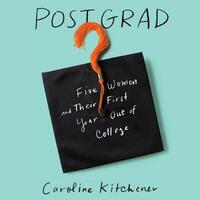Take a photo of a barcode or cover
challenging
informative
reflective
fast-paced
This nonfiction account fell short for me. It was difficult to connect to the women she followed and their lives following graduation. So many safety nets. Hard to recommend since the book offers so little insight on this time of their life’s.
emotional
reflective
sad
tense
medium-paced
Despite the rating I have given this book, it was not a bad read. I went through the book quickly and wanted to finish it. Here comes the but. As many people mentioned before, this book leaves a weird aftertaste. Yes, it is a book about mostly privileged Princeton graduates with wealthy families. It was still captivating. I understand the frustration that it just all seemed too easy for these five women because they had a safety net, no debt, etc. Honestly, sometimes it felt like the book was smoothing the edges. It felt a bit like a fairytale where heroines will have a good ending despite obstacles. But I really felt like it was because of the stylistic and writing choices (or maybe that is wishful thinking).
By the end of the book I started getting bored as everything worked out but it is a bit more nuanced. I did not like the approach to interviews and how the narrative was constructed. It was interesting but also at times read as a diary of a sort. And I really disliked (and I blame it on stylistic choices again tbh) how the author handled Olivia’s disappearance from their Princeton circles. I am properly worried about her and I wish I could find something about her. Overall, kinda boring book about very privileged young women from a top school. Very elitist, very hard to relate at times.
Most of their fears, conflicts and anxiety were based on the turmoil that comes after graduation. It was not because they could not afford rent in the cities they moved to or had ANY student debt. It was because it is Princeton, here people care more about what school or company you are going to after graduation rather than the shame of having to move back home before you figure out your career. The author interned at the Atlantic and then wrote the book, the rest found jobs relatively quickly or continued studying because their parents could pay for it. There were relatable post-graduation feelings but every time I was only reminded how different life can be when you graduate from Princeton (or any other Ivy or prestigious school). To that I don’t think I can ever relate
By the end of the book I started getting bored as everything worked out but it is a bit more nuanced. I did not like the approach to interviews and how the narrative was constructed. It was interesting but also at times read as a diary of a sort. And I really disliked (and I blame it on stylistic choices again tbh) how the author handled Olivia’s disappearance from their Princeton circles. I am properly worried about her and I wish I could find something about her. Overall, kinda boring book about very privileged young women from a top school. Very elitist, very hard to relate at times.
Most of their fears, conflicts and anxiety were based on the turmoil that comes after graduation. It was not because they could not afford rent in the cities they moved to or had ANY student debt. It was because it is Princeton, here people care more about what school or company you are going to after graduation rather than the shame of having to move back home before you figure out your career. The author interned at the Atlantic and then wrote the book, the rest found jobs relatively quickly or continued studying because their parents could pay for it. There were relatable post-graduation feelings but every time I was only reminded how different life can be when you graduate from Princeton (or any other Ivy or prestigious school). To that I don’t think I can ever relate
emotional
reflective
medium-paced
Minor: Eating disorder, Lesbophobia
emotional
funny
hopeful
informative
inspiring
reflective
slow-paced
The perspectives of the five women aren’t always quite distinct, with Olivia and Michelle often having the most similar viewpoints. I think that there is a good spread of the types of graduates, but there is generally a sense of “failure” among them. There are no materialistically successful people, and the novel often looks down upon or is condescending towards this population. Also, I know this is a semi-autobiography so the book can’t truly be finished yet, but the ending was highly anticlimactic.
This book follows five young women from a variety of backgrounds as they carve out a life for themselves after graduating from Princeton. The writing flowed easily between each woman's story, and it was interesting/a relief to see that even Ivy League graduates can be lost in life immediately following graduation.
However, it may be because this book followed Princeton graduates - a majority who came from incredibly wealthy families - that I had a hard time empathizing with the characters' struggles. Many of the issues these women faced felt not only like first-world problems, but upper class first-world problems. The author told her own post grad story interwoven with the other four graduates, and I couldn't feel bad for her when her mother chose to stay home to care for the author's ailing grandma instead of going to England with the rest of the family to spend Christmas together.
I also felt like compared to some of the issues the other women were dealing with, such as an incurable disease and an eating disorder, the author was trying to make problems out of nothing in her own life to gain the sympathy of the reader. Many of her reactions to her mother seemed over dramatic and premeditated, and I found myself more annoyed than enlightened by what I was reading most of the time.
Regardless, I have to give credit where it's due because the author followed graduates from different countries and classes for this book, so these stories better represent the diverse population of Millennials growing up today and chips away at the preconceived stereotype of Princeton as a WASP-y environment.
However, it may be because this book followed Princeton graduates - a majority who came from incredibly wealthy families - that I had a hard time empathizing with the characters' struggles. Many of the issues these women faced felt not only like first-world problems, but upper class first-world problems. The author told her own post grad story interwoven with the other four graduates, and I couldn't feel bad for her when her mother chose to stay home to care for the author's ailing grandma instead of going to England with the rest of the family to spend Christmas together.
I also felt like compared to some of the issues the other women were dealing with, such as an incurable disease and an eating disorder, the author was trying to make problems out of nothing in her own life to gain the sympathy of the reader. Many of her reactions to her mother seemed over dramatic and premeditated, and I found myself more annoyed than enlightened by what I was reading most of the time.
Regardless, I have to give credit where it's due because the author followed graduates from different countries and classes for this book, so these stories better represent the diverse population of Millennials growing up today and chips away at the preconceived stereotype of Princeton as a WASP-y environment.
Kitchener follows 4 of her fellow classmates from Princeton in their first year out of college to see how they navigate their post school years. I love this type of nonfiction as, with the exception of the introduction, it was just the stories of their lives. It brought me back to the uncertainty of my post college years.
I did like reading this book, particularly as I near my third month of post grad life. The five women (including the author) are all starkly different from each other, although they are all desperate to succeed (what does that even mean without grades?) in their first year out of school. Overall, I think it nails a message to the newly graduated: it’s okay for plans to change and it’s okay to take risks, it’s your life. I found it as a helpful reminder of this, but also that past the instagrams - most of your peers are also probably really struggling in some way or another. It is anecdotal but I thought it was interesting so many of them explored polyamorous relationships within the year... but none of them went well.
I found the stories engaging and all, but I don’t know if I would recommend this book to anyone who wasn’t exactly like me, a new college graduate or perhaps a graduating senior.
I found the stories engaging and all, but I don’t know if I would recommend this book to anyone who wasn’t exactly like me, a new college graduate or perhaps a graduating senior.
hopeful
informative
inspiring
reflective
medium-paced
Post Grad is a brilliant piece of narrative nonfiction that left me feeling a lot more at ease as I sit halfway through my first year removed from college. As the book mentions, what happens after graduation is typically presented solely through the lens of the end goal of a successful career with no clarity on the journey to get there. I felt drawn to each of the women's stories and rooted for their success as they search for their adult selves. There are many insights from there that I will take into my journey both personally and professionally.
All this taught me was that it's not the students who get into Princeton, it's the parents. Jesus. All of the women in this story were Ivy League-coached by their parents, who edited their essays and perfected their extracurriculars. For real? For every self-motivated student who gets rejected from Princeton, there's one of these kids whose parents wrote their college essays and who can't function when they choose a career path that isn't on the Approved List.
Also, the love that comes from these parents seems to be entirely based on whether or not the child follows the parents' dreams exactly, thus is highly conditional. TWO different parents in this book said that they didn't love or recognize their child anymore, even though they did well at Princeton, just because the kid made different and not even harmful choices.
This book would be better framed as an exposé on Ivy League parents who don't seem to love their kids, only the graduation programs that say "Princeton" on them.
Also, the love that comes from these parents seems to be entirely based on whether or not the child follows the parents' dreams exactly, thus is highly conditional. TWO different parents in this book said that they didn't love or recognize their child anymore, even though they did well at Princeton, just because the kid made different and not even harmful choices.
This book would be better framed as an exposé on Ivy League parents who don't seem to love their kids, only the graduation programs that say "Princeton" on them.


